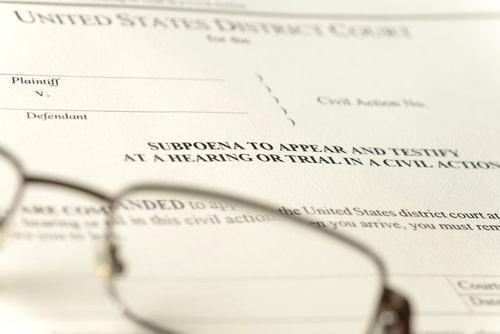Recent Blog Posts
Can Child Custody Issues Be Included in a Prenuptial Agreement?
 When couples enter into a prenuptial agreement, they often want to include provisions related to property division and spousal support. However, some couples may also want child custody and visitation provisions. In Illinois, the state’s family law statutes do not allow couples to include child custody provisions in prenuptial agreements. If you need legal assistance in ensuring your prenuptial agreement is legally binding, contact a family lawyer to ensure you can create an ironclad prenup void of costly errors.
When couples enter into a prenuptial agreement, they often want to include provisions related to property division and spousal support. However, some couples may also want child custody and visitation provisions. In Illinois, the state’s family law statutes do not allow couples to include child custody provisions in prenuptial agreements. If you need legal assistance in ensuring your prenuptial agreement is legally binding, contact a family lawyer to ensure you can create an ironclad prenup void of costly errors.
How Are Child Custody Matters Handled in Illinois?
Under Illinois law, decisions concerning child custody must be made with the best interests of the child in mind. The court has various considerations when making a custody determination, such as the child’s current relationship with their parents, the parent’s ability to care and provide for the child’s needs, and the age and gender of the child, among other things. While prenuptial agreements are designed to allow couples to make their own decisions about property rights and other financial matters when it comes to anything related to children, the law has determined this is an area that needs to be decided on an individual basis and, according to the child’s needs.
What is the Role of Psychological Evaluations in Litigation Involving the Allocation of Parental Responsibilities in Illinois?
 In Illinois, figuring out custody and the allocation of parental responsibilities can be complicated and emotionally arduous, as parents tend to be strongly opinionated as to their wishes regarding their children. During the custody evaluation process, psychological evaluations are often requested to gain a better understanding of a parent’s mental health and psychological functioning. These evaluations can provide valuable insights into how a parent’s emotional state affects their ability to parent effectively. For legal assistance regarding this important matter, contact a skilled child custody lawyer to put yourself in the best position to pursue a favorable custody and case outcome.
In Illinois, figuring out custody and the allocation of parental responsibilities can be complicated and emotionally arduous, as parents tend to be strongly opinionated as to their wishes regarding their children. During the custody evaluation process, psychological evaluations are often requested to gain a better understanding of a parent’s mental health and psychological functioning. These evaluations can provide valuable insights into how a parent’s emotional state affects their ability to parent effectively. For legal assistance regarding this important matter, contact a skilled child custody lawyer to put yourself in the best position to pursue a favorable custody and case outcome.
When Are Psychological Evaluations Used?
Psychological evaluations are typically used in cases where there are concerns about a parent’s mental health, history of substance abuse or addiction, or any significant mental or psychological issue affecting their ability to parent. A court may order a psychological evaluation in an Illinois custody case if it deems it necessary to determine the best interests of the children involved. While medical records and personal testimony are also helpful in making such determinations regarding a parent’s mental and emotional health, psychological evaluations are often the most useful in forming a complete picture of a parent’s overall mental health and emotional functioning.
Does Illinois Require Separation Before Divorce?
 The divorce process in Illinois is both complex and emotional. Understanding the state's divorce requirements is important to navigate it effectively. Separation is a significant requirement, but it is often misinterpreted.
The divorce process in Illinois is both complex and emotional. Understanding the state's divorce requirements is important to navigate it effectively. Separation is a significant requirement, but it is often misinterpreted.
Requirement for Separation
Illinois law mandates that spouses either live apart for six months in separate homes or declare that their marriage has broken down irretrievably; all reconciliation attempts have failed, and any future attempts would not be in the family's best interest. This rule is intended to allow spouses to reconsider and potentially reconcile before proceeding with the divorce. The six-month rule does not mean that the parties must remain apart for six months before filing for divorce. It means that they must have been living separately for six months before the date of filing.
Grounds for Divorce
In January 2016, Illinois introduced a new law that only accepts "irreconcilable differences" as a reason for divorce. Earlier, fault-based divorces were allowed on grounds like adultery. In Illinois, the only grounds for divorce are irreconcilable differences, which means that the marriage has experienced an irretrievable breakdown. The judge will assume irreconcilable differences have been met if the spouses have lived separately for six consecutive months before the divorce judgment.
Are Spousal Maintenance Payments Automatically Awarded in Illinois Divorce Cases?
 Spousal support, commonly referred to as spousal maintenance or alimony, is a vital consideration in many divorce cases, assisting individuals in maintaining their financial well-being after divorce proceedings have been completed. Often parties in a divorce may be unaware of the factors determining whether spousal maintenance is paid or what amount should be paid to the requesting party. One widespread assumption is that spousal maintenance payments are automatically awarded in divorce cases. However, this is not the case.
Spousal support, commonly referred to as spousal maintenance or alimony, is a vital consideration in many divorce cases, assisting individuals in maintaining their financial well-being after divorce proceedings have been completed. Often parties in a divorce may be unaware of the factors determining whether spousal maintenance is paid or what amount should be paid to the requesting party. One widespread assumption is that spousal maintenance payments are automatically awarded in divorce cases. However, this is not the case.
Illinois provides guidelines as to determining whether spousal maintenance payments will be awarded. The final decision will rely upon the individual case specifics and circumstances. There is no universal formula to determine a payment amount. If you have questions or concerns about spousal payments, contact a divorce attorney to see how spousal payments may or may not be relevant to your case.
How Are Subpoenas Used in a Divorce Case?
 Contested divorce cases are those in which the spouses disagree about one or more divorce issues. Disagreements about how marital property should be distributed between the spouses or who should have the majority of the parenting time with the children are just some of the circumstances that can lead to a contested divorce case.
Contested divorce cases are those in which the spouses disagree about one or more divorce issues. Disagreements about how marital property should be distributed between the spouses or who should have the majority of the parenting time with the children are just some of the circumstances that can lead to a contested divorce case.
Gathering relevant evidence from the parties is a crucial aspect of a contested divorce case. If the spouses are not willing to provide information voluntarily, various legal tools may be used to gather the necessary information, documentation, or testimony. Subpoenas are one such legal tool used in a divorce case.
What is a Subpoena?
A subpoena is a legal summons, issued by a court or lawyer, that requires someone to provide information or documents relevant to a legal case. Subpoenas can be issued to any person or entity with information pertinent to the case. For instance, in a divorce case, one spouse may subpoena financial documents from the other spouse's employer or bank.
How Are Child-Related Issues Different in a High-Asset Divorce Case?
 High-asset divorce cases are divorce cases involving significant wealth. These types of divorces are often much more complicated than a typical divorce. Property division, spousal maintenance, and other financial issues are often a significant source of this complication. However, child-related issues can also be difficult to handle in a high-asset divorce.
High-asset divorce cases are divorce cases involving significant wealth. These types of divorces are often much more complicated than a typical divorce. Property division, spousal maintenance, and other financial issues are often a significant source of this complication. However, child-related issues can also be difficult to handle in a high-asset divorce.
Maintaining a Child’s Lifestyle
In high-asset divorces, children often expect a certain standard of living because of the family's financial resources. The child may attend a private school, receive one-on-one tutoring, or participate in expensive extracurricular activities. Illinois courts seek to preserve a child's standard of living and avoid divorce consequences that negatively impact the child. After all, divorce is between the adults, not the child.
Child Support in High-Asset Divorce Cases
Co-Parenting Tips for Recently Divorced Individuals In Kane County
 Divorce is one of the most challenging life events an individual can go through, especially when children are involved. Figuring out how to co-parent with your ex and create a stable, nurturing environment for your children can be very difficult. Good co-parenting requires flexibility, open communication, and a shared goal of doing what is best for the children. In this blog, we will discuss tips for successful co-parenting with an ex-spouse.
Divorce is one of the most challenging life events an individual can go through, especially when children are involved. Figuring out how to co-parent with your ex and create a stable, nurturing environment for your children can be very difficult. Good co-parenting requires flexibility, open communication, and a shared goal of doing what is best for the children. In this blog, we will discuss tips for successful co-parenting with an ex-spouse.
Communicate Frequently, But Get It In Writing
Even if your parenting plan spells out the terms of the parenting time schedule, allocation of parental responsibilities, and other parenting matters, you will still need to communicate with your child's other parent from time to time. Establish a respectful and open line of communication, focusing on the children instead of any interpersonal conflict with your ex.
Communication through text messages, emails, and other written forms is often preferred to phone calls or face-to-face communication. Written communication allows both parties to ensure that what they are saying is helpful and will not stir up unnecessary conflict. Having your discussions in writing is also useful if there is ever a misunderstanding or question about the plans that were made.
Understanding Shared Parenting Time in a DuPage County Divorce
 Divorcing parents have many different options for raising their children as divorced co-parents. For some divorcing spouses, it makes sense for one parent to take most or all the parenting responsibilities and parenting time. For example, if one parent works in another state, frequently travels outside the country, is incarcerated, or cannot provide a safe home for the children, sole custody may be in the child’s best interests.
Divorcing parents have many different options for raising their children as divorced co-parents. For some divorcing spouses, it makes sense for one parent to take most or all the parenting responsibilities and parenting time. For example, if one parent works in another state, frequently travels outside the country, is incarcerated, or cannot provide a safe home for the children, sole custody may be in the child’s best interests.
In other cases, parents want to share responsibility for their child and ensure they both spend enough time with the child. Illinois law used to refer to this type of arrangement as joint custody. However, the language used in Illinois child custody laws has since been updated. A custody arrangement in which both parents have a relatively equal amount of parenting time is called shared parenting time.
Can You Get an Annulment in Illinois?
 Most people are only vaguely familiar with the concept of marriage annulment. They may have heard about celebrity couples who get married only to have their marriage annulled a few days later or heard a rumor that you can get your marriage annulled if you have not had sexual intercourse yet. The reality of the situation is much more complex.
Most people are only vaguely familiar with the concept of marriage annulment. They may have heard about celebrity couples who get married only to have their marriage annulled a few days later or heard a rumor that you can get your marriage annulled if you have not had sexual intercourse yet. The reality of the situation is much more complex.
Annulment, or as it is called in Illinois, Declaration Of Invalidity Of Marriage, is permitted by Illinois law. However, you can only get your marriage annulled in a very narrow range of circumstances.
If you are married and wish to get your marriage annulled but do not qualify for an annulment, the only option you have for ending your marriage is divorce. In this blog, we will explain when and how annulment is possible in Illinois and what you can do if you require legal help to end your marriage.
Invalidity of Marriage Requirements
When a marriage is dissolved through divorce, the marriage relationship is terminated. When a marriage is annulled through a Declaration Of Invalidity Of Marriage, it is as if the marriage never happened.
What Happens to Our Vacation Home In A Divorce?
 Vacation homes are more than just a piece of real estate. Countless joyful memories were likely made in your vacation home, and the property has just as much sentimental value as it has financial value.
Vacation homes are more than just a piece of real estate. Countless joyful memories were likely made in your vacation home, and the property has just as much sentimental value as it has financial value.
Understandably, disputes can arise when addressing ownership of a vacation home in an Illinois divorce. In this blog, we will discuss how vacation homes are handled during the divorce process and what you can do to receive personalized advice regarding property division issues and other divorce concerns.
Who Owns a Vacation Home if You Get Divorced?
Per Illinois law, marital property includes assets that either spouse purchased or otherwise obtained during the marriage. Property that was owned by a spouse before the marriage is usually non-marital property, but there are several exceptions.












